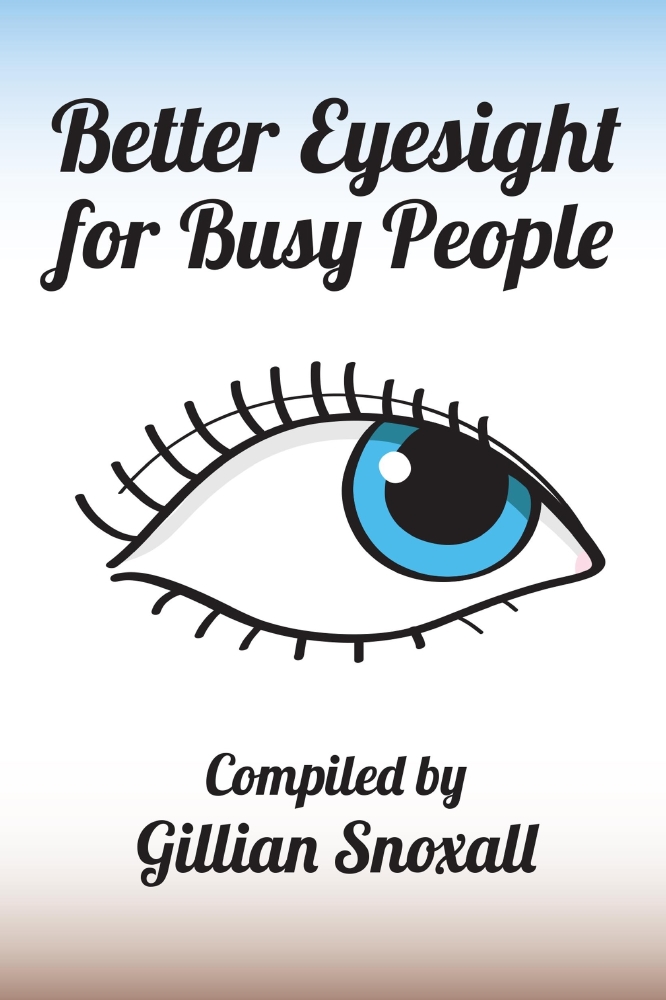Following the successful publication of my little book on natural vision improvement, Better Eyesight for Busy People, many readers have asked me if I can offer any advice for keeping their eyesight in tip-top condition.

Gillian Snoxall
Of course, I remind them that the most beneficial thing they can do for their eyesight is to make a habit of practicing, on a daily basis, the exercises described in the book. Just as the muscles of the body respond to exercise, I tell them, so the eyes are strengthened and kept fit by exercise.
I am not an expert in nutritional science, but I believe that my own good health and excellent eyesight are as much the result of healthy eating as exercise. I have reached the age of 78 with excellent eyesight and good health generally. I do not wear glasses, have all my own teeth, take no medication whatsoever, and seldom see a doctor.
Where our daily meals are concerned I like to keep things simple, combining the best fresh ingredients with the least cooking - or, preferably, serving them raw as in a salad. I choose to buy organic foods as much as possible, as I don't like the thought of eating anything that may have been grown with artificial fertilisers, sprayed with chemicals, or fed antibiotics or growth hormones. Organic foods also taste better.
It has to be said, therefore, that a well balanced diet, with the emphasis on fresh fruit and vegetables and plant-based whole-foods, is also vitally important to the health of both the body and the eyes.
My top five tips to improve your vision would therefore be that you should:
1. Follow a well balanced diet with the emphasis on fresh fruit and vegetables
2. Avoid processed foods and those with a long list of ingredients
3. When working at the computer look away frequently
4. Quit smoking
5. Start your day with muesli (preferably homemade)
Food and Nutrition
Regularly including the following foods in your diet will ensure the good health of your eyes and body:
Green, leafy vegetables such as spinach, kale, Swiss chard, broccoli, and Brussels sprouts, all of which are high in lutein and zeaxanthin which are both important for eye health and clear vision
Yellow and red vegetables such as carrots, sweet potatoes, butternut squash and orange-coloured pepper are all a good source of vitamins C and E, which are thought to reduce the progress of macular degeneration. They are also high in lutein and zeaxanthin. (According to a 1998 study in the British Journal of Ophthalmology, orange pepper had the highest amount of zeaxanthin of the 33 fruits and vegetables tested)
Oily fish such as tuna, salmon, mackerel, sardines, trout and herring. Oily fish are high in long-chain omega-3 fatty acids, which are believed to be beneficial to the eyes, as well as a help to preventing heart disease. They are also a good source of vitamin D. Vitamins A, C and E are antioxidants that have been well-established as preserving eyesight and promoting healthy eyes, but evidence suggests vitamin D is associated with reduced risks of macular degeneration
Eggs and other non-meat sources of protein. Egg yolk is a source of both lutein and zeaxanthin, along with healthy fat and protein, in a highly-absorbable, almost ideal form. As lutein is oil-soluble, homemade mayonnaise (containing as it does both raw egg and olive oil) is an excellent vehicle for this valuable nutrient
Citrus fruits and juices, berries, beans and nuts (especially almonds, which are rich in vitamin E)
Muesli, especially homemade muesli, is the ideal breakfast. Usually made up of oats, flakes, dried fruit and nuts, it is high in fibre and whole grains and has less sugar and calories that most other cereals on supermarket shelves. The addition of nuts - especially walnuts - provides a great source of protein and omega-3 fatty acids, which are good for the eyes, heart and brain. Muesli also has the advantage of being filling, making it easier to resist snacking between meals
- If you take with you to work a lunch of sandwiches, make sure they are filled with some of the healthy ingredients listed above, and drink only water or organic fruit juice. If you are lucky enough to be able to buy a sourdough loaf, let that be your bread of choice. Sourdough, which is often referred to as "the king of breads", is made only of natural, unbleached flour, water and salt, whereas our modern supermarket loaves are made with flour that has been chemically bleached and contain as many as 29 additives. (Sourdough bread is not in the least bit sour; the name sourdough has come to us from ancient times and refers to the fermenting process, which takes place before the bread is formed)
- I take the view that anything with a long list of ingredients is better done without. It is a good idea to become a reader of labels, avoiding anything which contains additives such as preservatives, artificial colouring, flavour enhancers, etc. Processed foods should also be avoided, especially those which have added sugar (or fructose); as should all bottled soft- drinks, except organic fruit juice
- In our household we eat very little sugar - and then only the non-refined Demerara variety - and the same goes for salt. We use only sea salt flakes in our cooking, and organic olive oil
In summary, a diet that is based on starchy foods like rice, potatoes and pasta, with plenty of fresh fruit and vegetables, protein-rich foods such as meat, fish and pulses (such as lentils), some milk and dairy foods and not too much fat, will give you all the nutrients you need.
Furthermore, eating a balanced diet will help you to maintain a healthy weight and thus avoid such obesity-related diseases as type 2 diabetes. Diabetes is the leading cause of blindness in adults.
Other advice
- I remember reading (though I can't remember where) that artificial sweeteners are positively bad for the eyes, so obviously they are best avoided. If you need a sweetener, perhaps you can try honey instead
- If you are spending long hours at the computer, make sure that you look away (preferably out of the window) every few minutes, to change the focus of your eyes and give them a rest
- It is also advisable to quit smoking. Everyone now knows that smoking can cause heart disease and lung cancer; but many people don't realise that smoking also increases the risk of age-related macular degeneration, cataracts, glaucoma and diabetic retinopathy
Eyebright Herbal Remedy
Several readers have asked me about herbal remedies, such as eyebright, for pink eye and similar complaints. While I find the subject very interesting, I have never used eyebright myself, and nor is it used in the medical profession today, mainly because of the lack of research and the problems of keeping the formulas sterile enough to use in the eyes. However, most modern herbalists do recommend eyebright, as do naturopaths and homeopaths. Because eyebright seems to work for those who try it and because so many herbal companies are formulating formulas with eyebright, we are starting to see some research and small studies being done on the effects of eyebright by these herbal companies, which I hope will lead to its being more generally used in the future.
The famous 17th Century herbalist Nicholas Culpepper said of eyebright ( Euphrasis officinalis): "If the herb was but as much used as it is neglected, it would half spoil the spectacle maker's trade." He also said eyebright helped "all infirmities of the eyes that cause dimness of sight." In the 18th Century eyebright tea was used, and there was a kind of ale called Eyebright Ale used in Queen Elizabeth's time.
Better Eyesight for Busy People (ISBN-10: 1783240393) by Gillian Snoxall is available now, priced £4.99 in paperback and £3.99 as a Kindle eBook. Visit www.gilliansnoxall.com .


